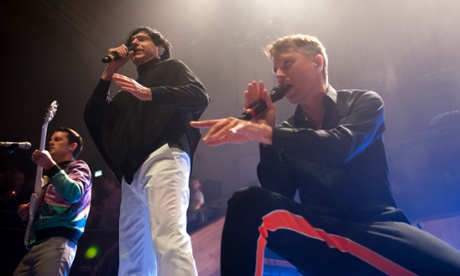
Mergers seem to be catching on in pop. 2014’s amalgamation of pop-punk boy bands Busted and McFly as McBusted now fills arenas. Hot on their heels come FFS, the cheeky moniker under which two of pop’s more renowned art-rock bands, Glasgow’s Franz Ferdinand and Los Angeles veterans Sparks, now trade. Although welding bands together like some sort of Frankenstein pop monster seems like the sort of thing you’d get a mad scientist doing, this coupling makes sense. Franz started life covering the Mael brothers’ Achoo and banged on about Sparks’ influence even though the mainstream hordes who bought Franz’s 2004 hit Take Me Out may have thought they meant a firm of electricians.
If Franz’s critical and commercial halo has slipped in recent years, their pioneering pop counterparts have spent the last few years innovating in everything from classical to pop opera without quite finding the sort of foothold in popular culture their glam and disco-era hits did in the 70s and early 80s. The appeal of a union suiting both parties must have grown even stronger when their recent eponymous album appeared to some of the best reviews of the 20-odd long-players they’ve notched up between them.
The live show takes it to another level. FFS are a six-headed, hook-laden groove machine with two frontmen (the raven-haired, black kaftan-wearing Russell Mael and the kung fu-kicking, archly posing, eyebrow-rocketing Alex Kapranos), bass, drums and guitar. They also understand the appeal of placing a strange-looking man on keyboards at the centre of the stage.
The shirt-and-tied Ron Mael – whose instrument, comically, reads “Ronald” in the font of keyboard manufacturer Roland – has barely changed persona since those infamous 1970s Top of the Pops appearances when his slicked hair, Hitler moustache and inscrutable stare alarmed and fascinated a generation of schoolkids. FFS may well be pop’s equivalent of a cut-and-shut car, but the lineup welds together seamlessly and economically – you couldn’t combine many pop groups and still only have a six-piece. While the bands’ shared knowledge of pop construction is obvious from opener Johnny Delusional, it wouldn’t work without the palpable sense of fun, respect and bonhomie (a grin between the frontmen here, a hand on the shoulder there), which soon spreads to their united fanbase. Indeed, it’s rare to encounter a gig where there are so many smiling faces.

The songs are dispatched at hurtling pace. Police Encounters sounds like a science-fiction reincarnation of the theme from Chitty Chitty Bang Bang and The Man Without a Tan rifles through their collective stockpile of hooks. One of the clever aspects of the merger is that Franz get to indulge their disco dreams (especially on Call Girl) while their electronic other half can return to their early guitar format without it seeming like nostalgia.
Similarly, their old hits sound refreshed. Franz’s Do You Want To is bigger and more operatic. Sparks’ sublime Giorgio Moroder-produced electro shimmer from 1979, The Number One Song in Heaven, revels in the juxtaposition of Russell Mael’s airy falsetto and black-shirted Kapranos’s Bryan Ferry croon. The audience erupt when Ron Mael suddenly gets up and does a gloriously deadpan, loose-limbed dance reminiscent of Monty Python’s Ministry of Silly Walks. Take Me Out and Sparks’ signature smash This Town Ain’t Big Enough for Both of Us are met with similar pandemonium, but the new songs more than hold their own.
Indeed, the Bowie-ish Little Guy from the Suburbs – which seems to be about a man seeking warped immortality through serial murder – is one of the darkest, most eerily affecting songs either band have ever done. The final encore isn’t an old classic, but a new song that could soon become one. Collaborations Don’t Work is a richly ironic, in-joke-laden (“If I ever need a father, it won’t be you, old man!”) dismissal of the benefits of teamwork which rummages through genres – acoustic crooning to orchestral pop to music hall – like a sock drawer. FFS have somehow managed to be more than just the sum of their parts, and there’s a lovely moment when the two generations of art-rock musicians unite together on the stage and celebrate their union with a rather touching group hug.







